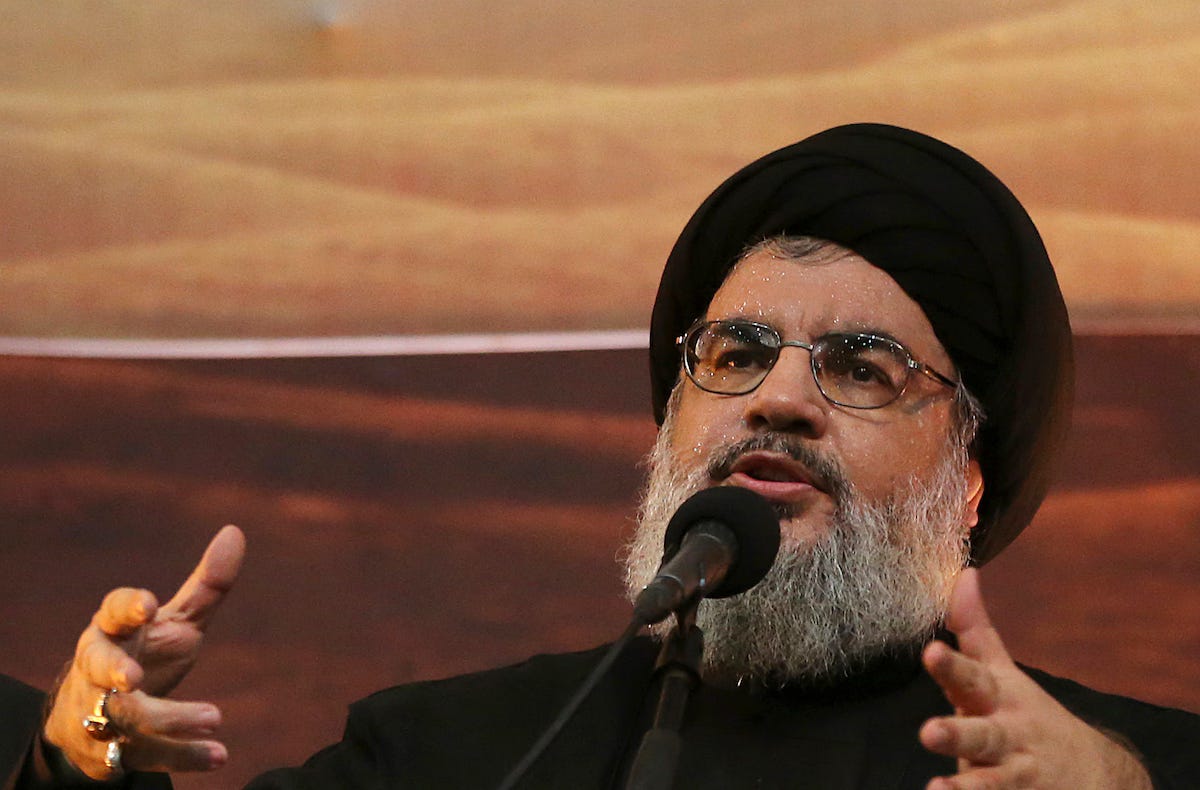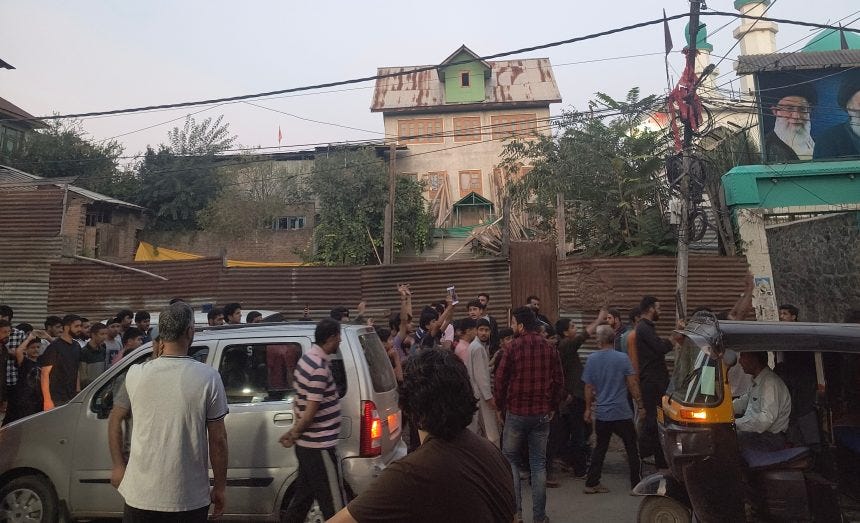Hezbollah Leader Hasan Nasrallah Killed in Israeli Airstrike on Beirut
Understanding the Kashmir Protests in Light of India’s Official Stance on Palestine.

Hezbollah Leader Hasan Nasrallah Killed in Beirut Airstrike
Hasan Nasrallah, the 64-year-old Shiite cleric who led Hezbollah for decades, was killed on 27th September 2024 in an airstrike in Beirut. Known for his pivotal role in transforming Hezbollah from a local Lebanese militant group into a formidable paramilitary force, Nasrallah left an indelible mark on the Middle East. The Israel Defence Forces (IDF) confirmed Nasrallah's death, along with other Hezbollah commanders, in what they described as a precision strike on the group’s "central headquarters" in the southern suburbs of Beirut. Hezbollah confirmed his death but did not disclose details of the cause, as plumes of smoke rose over the levelled residential buildings in the city’s south.
Rise to Power
Nasrallah’s rise to leadership began in the early 1990s, following the assassination of his predecessor, Abbas al-Musawi, by Israel. Under his leadership, Hezbollah grew from a guerrilla resistance group, originally dedicated to expelling Israeli forces from southern Lebanon, into a powerful regional actor. Nasrallah led Hezbollah in extending its military operations beyond Lebanon’s borders, engaging in conflicts in Syria, Iraq, and Yemen, with its influence expanding in both military and political spheres. While his supporters praised him as a guardian of Lebanon’s Shiite community and a champion of the Palestinian cause, his critics, especially in Israel and the West, viewed him as the mastermind behind numerous terrorist activities.
A Polarising Leader: Israeli Perspective
From Israel's viewpoint, Nasrallah's death represents the removal of one of its most formidable enemies. The Israeli government has long viewed Hezbollah under Nasrallah's leadership as a direct and existential threat. Hezbollah, with its vast arsenal of rockets and well-trained fighters, has been engaged in several military confrontations with Israel, notably the 2006 Lebanon War. Nasrallah was regarded as the architect behind Hezbollah’s military strategies, including the ability to strike deep into Israeli territory. An Israeli official, in response to his death, commented, "Nasrallah’s elimination is a victory for Israel's security and a blow to the forces of extremism in the region." Despite this, Hezbollah’s military presence on Israel’s northern border remains a critical concern, and his death may ignite further tensions.
Nasrallah’s Role in the Wider Palestinian Cause
Throughout his leadership, Nasrallah maintained unwavering support for the Palestinian cause, aligning Hezbollah with various Palestinian factions, most notably Hamas. He saw the struggle against Israel as a shared mission, linking Hezbollah’s operations with the broader effort to oppose Israeli occupation in Palestine. In recent years, as tensions escalated in Gaza, Nasrallah’s Hezbollah launched sporadic attacks on Israeli positions in support of Palestinian fighters, portraying Hezbollah as a crucial ally in the resistance against Israel. His death is seen by many within the Palestinian movement as a significant loss, as Nasrallah represented a regional force challenging Israeli policies and military actions.
U.S. Perspective: A Terrorist Leader
The United States, long considering Hezbollah a terrorist organisation, has been consistent in its condemnation of Nasrallah and his role in fuelling conflicts across the Middle East. Nasrallah was placed on the U.S. Treasury Department’s "global terrorist" list in 2012, and Hezbollah was linked to several high-profile attacks against U.S. personnel, including the 1983 bombing of the U.S. Marine barracks in Beirut. U.S. officials described his death as a pivotal moment in curbing Iranian influence in the region, as Hezbollah has been Tehran's most important proxy force. A State Department official noted, "Nasrallah’s death is a victory in the fight against terrorism and a chance for Lebanon to emerge from Hezbollah’s shadow." However, there is concern in Washington about the potential for instability in Lebanon following Nasrallah’s death, given Hezbollah’s entrenchment in Lebanese politics and society.
The Impact on Lebanon and Hezbollah’s Future
Within Lebanon, Nasrallah was seen as both a political leader and a military figure. Under his leadership, Hezbollah grew into the country’s most dominant political party, controlling a significant portion of Lebanon’s parliament and cabinet. His death leaves a gaping void in both Hezbollah’s leadership and in the broader Iranian strategy across the Middle East. Hezbollah, with its extensive network of social services for Lebanon’s Shiite community, has long operated as a parallel state, surpassing the capabilities of the Lebanese government. Analysts predict that Nasrallah’s death could lead to internal power struggles within Hezbollah, although the group’s military prowess and influence are unlikely to diminish immediately.
Protests in Kashmir and Reactions in the Muslim World
In Muslim-majority Kashmir, which is currently in the midst of state elections, the news of Nasrallah's death sparked peaceful protests and mourning (click for ANI video). Several political leaders paused their election campaigns for a day in respect. Kashmiris, who often relate their own struggle for autonomy with the Palestinian cause, viewed Nasrallah as a symbol of resistance against oppression. The peaceful protests in Srinagar reflected the broader sentiments in the Muslim world, where Nasrallah was regarded by many as a champion of Muslim unity and resistance against Western and Israeli hegemony.
Understanding the Kashmir Protests in Light of India’s Stance on Palestine
For those questioning the spontaneous protests in Kashmir over the death of Hezbollah leader Hasan Nasrallah, it is crucial to understand the broader context of India’s official stance on the Israel-Palestine issue. The Government of India (GOI), led by Prime Minister Narendra Modi, has consistently articulated support for the Palestinian people while emphasising peace and stability in the region. During a recent meeting with Palestinian President Mahmoud Abbas on the sidelines of the UN General Assembly, Prime Minister Modi expressed "deep concern at the humanitarian crisis unfolding in Gaza" and reaffirmed India's "unwavering support to the people of Palestine," underscoring India's principled position on the Israel-Palestine conflict. This stance reflects India's longstanding advocacy for a two-state solution and a peaceful resolution through dialogue and diplomacy, highlighting the government's balanced approach to Middle Eastern politics.
While the protests in Kashmir may appear aligned with solidarity for global Muslim causes, including Palestine, critics should also acknowledge that India, through its official diplomatic channels, has expressed concern over the situation in Gaza and reiterated support for a peaceful solution. It is in this context that the spontaneous outpouring of emotions in Kashmir can be seen—indicative of broader regional concerns about the humanitarian toll in Palestine. The Indian government’s position remains firmly rooted in supporting Palestinian rights while maintaining the importance of law and order domestically.
Summing Up
Hasan Nasrallah's death marks the end of an era for Hezbollah and the broader Middle East. His leadership not only transformed Hezbollah into a dominant military and political force but also made it an essential player in the wider Palestinian cause and the resistance against Israeli and Western influence in the region. While his death is celebrated by his foes, particularly in Israel and the United States, it raises significant questions about the future of Hezbollah, Lebanon’s stability, and Iran’s regional ambitions. His legacy as a controversial yet influential leader will continue to shape the dynamics of the Middle East for years to come.





ਤਾਨਾਸ਼ਾਹ ਬਦਮਾਸ਼ ਕਾਤਲ ਬੰਦਿਆਂ ਦਾ ਇਹ ਹੀ ਹਾਲ ਹੁੰਦਾ ਹੈ। ਇਹਨਾਂ ਦੇ ਮਰਨ ਤੇ ਲੋਕਾਂ ਦੀ ਵੱਡੀ ਗਿਣਤੀ ਖੁਸ਼ੀ ਮਨਾਉਂਦੀ ਹੈ ਅਤੇ ਰਾਹਤ ਮਹਿਸੂਸ ਕਰਦੇ ਹਨ
ਨੇਕ ਲੋਕਾਂ ਨੂੰ ਲੋਕ ਪਿਆਰ ਸਤਿਕਾਰ ਅਤੇ ਇੱਜਤ ਨਾਲ ਵਿਦਾ ਕਰਦੇ ਹਨ । ਬੱਸ ਇਹ ਹੀ ਫਰਕ ਹੈ ਇਨਸਾਨ -ਇਨਸਾਨ ਵਿੱਚ।
ਪਾਪੀ ਕੇ ਮਾਰਨੇ ਕੋ ਪਾਪ ਮਹਾ ਬਲੀ ਹੈ